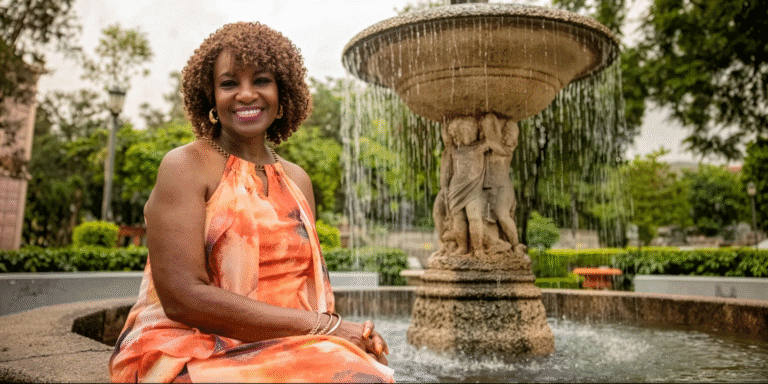For Dr. LaVerne Hanes Collins, strength has never been the full story.
Most of us are taught to push through pain. Keep moving. Wear the mask. Stay strong. And in many ways, strength itself can feel like victory. But what if strength is not the finish line?
“Strength without healing is just survival,” she says. “You can look strong on the outside, but if you never stop to heal, you’re just hanging on. Survival is staying alive. Healing is learning to live again.”
It’s a paradox Collins knows firsthand. As the founder and CEO of New Seasons Counseling, Training, and Consulting, LLC, she has built a career helping others navigate trauma, faith, and racial and cultural identities. Yet her professional expertise is rooted in deeply personal valleys.
From Barren Soil to Living Fruit
What if strength without healing keeps us stuck? That question is at the heart of her life, her counseling practice, and her two books: The Fruit of Your Pain (now in its newly-released second edition) and Overlooked: Counselor Insights for the Unspoken Issues in Black American Life.
Collins explains that both books ask hard questions about suffering. Both point toward an even harder truth: healing doesn’t come from pretending the pain isn’t there. Healing comes from naming it, grieving it, and allowing God—and trusted community—to transform it.
Collins’ story is planted in real storms: surviving a ruptured brain aneurysm at age 33, and then enduring a rapid barrage of family deaths, including both of her parents within a few months of her aneurysm. The string of losses left her, an only child, with no living biological elders.
That led to Dr. Collins writing the first edition of The Fruit of Your Pain over 20 years ago. She describes herself as a new counselor and young minister trying to survive her own valley at that time. “My message back then was raw testimony: God can meet us in our grief and make us better rather than bitter.”
But the second edition, written after decades of clinical practice, is different because it is also the fruit of a harder and deeper pain. In 2019, Collins lost her 32-year-old son to depression. “My son didn’t survive, but I had to learn to heal—to live again.” So this book is not about pushing through. It’s not just about pruning and planting. It’s about the Master Gardener’s paradoxical work of healing the overlooked root damage of our pain, so our lives can produce the healthy fruit we desire.
Patience where there had only been panic. Joy born in mourning. Gentleness after anger.

The Mask of Strength
As a Black woman and counselor, Collins says, “I know how cultural narratives about strength can both save us and harm us. The ‘Strong Black Woman’ narrative honors resilience, but it often denies vulnerability. It applauds survival but neglects healing.”
That’s why Collins says, “Strength without healing is just survival.” She believes the mask of outwardly thriving while being inwardly broken is a socially acceptable self-misrepresentation and, in many circles, even a religious expectation. But masks don’t heal; honesty does.
Overlooked, No More
This conviction flows into Dr. Collins’ second book, Overlooked: Counselor Insights for the Unspoken Issues in Black American Life.

Where The Fruit of Your Pain names personal valleys, Overlooked names cultural ones—unseen biases, silenced grief, ignored trauma. In both, the message is the same: what is hidden and hurting must be brought into the light if there is to be freedom.
Collins says, “In counseling rooms, I have sat with people whose roots were eaten up by trauma, and I watched them begin to bear fruit again. In classrooms and churches, I have trained counselors, pastors, and leaders to see the wounds they’ve overlooked in themselves and in others.”
Because whether it’s one life or a whole culture, healing requires visibility. It requires courage. And it requires faith—faith that something good can still grow from the worst of our experiences. She adds, “That always starts with seeing what’s unhealed in me.”
Why This Work Matters Now
Collins says, “We live in a world addicted to survival.” She adds, “Hustle culture prizes busyness over balance and harmony. Racism, sexism, and systemic injustice keep entire communities in survival mode. And mental health stigma—especially in some faith spaces—still tells people to ‘pray harder’ instead of to feel honestly and heal deeply.”
Her work as a counselor, speaker, and writer is to break that cycle. To integrate faith, race, culture, and trauma in ways that are clinically sound, culturally relevant, and spiritually rooted. To help people move from overlooked to seen, from surviving to healing, from barren soil to unexpected fruit.
A Broad Vision for Healing
Dr. Collins’ recognition as one of the Most Influential Leaders in Mental Healthcare to Watch and also as one of the Most Trusted Trainers in Mental Health Continuing Education in 2025 underscores what audiences already know: Collins is more than a clinician. She is a trailblazer with the courage to speak hard truths and the compassion to lead others toward healing.
As a keynote speaker, Collins brings this same authenticity to the stage. She doesn’t just present theories; she weaves stories that are both deeply personal and universally resonant. Audiences connect because her message is lived, not merely learned.
Looking ahead, Collins envisions multicultural workplace wellness programs, organizational training on trauma-informed care, and broader platforms where emotional healing and cultural intelligence are recognized as assets for leadership and innovation.
Dr. LaVerne Hanes Collins has shown that mental health must be more than symptom management, it must be cultural, communal, and deeply human. For those seeking to engage with her work, Collins offers not just counseling or keynotes but a movement: a call to build systems that see everyone, heal everyone, and leave no story untold.
To learn more about Dr. Collins, her books, or her consulting and training programs, visit New Seasons Counseling, Training & Consulting or connect with her on Facebook, YouTube, and LinkedIn.


